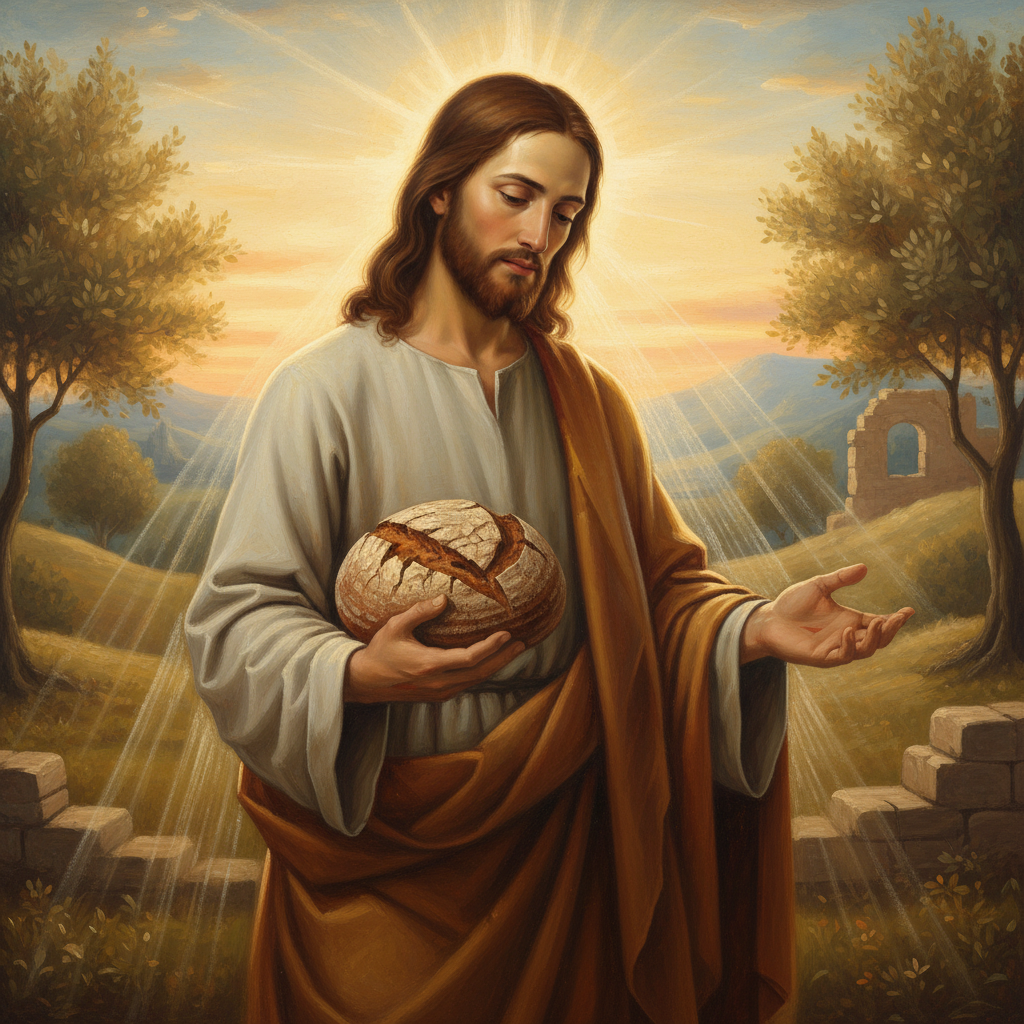In John 6:35, Jesus Christ makes the profound declaration, ‘I am the bread of life. Whoever comes to me will never go hungry, and whoever believes in me will never be thirsty.’ This verse signifies that Jesus is the exclusive and all-sufficient source of spiritual nourishment and eternal life. Just as physical bread sustains the body, a personal relationship with Christ through faith satisfies the deepest longings and needs of the human soul, leading to everlasting fulfillment.
Many people feel adrift while searching for fulfillment in this world. They seek something to satisfy the soul’s deepest longings, but earthly pursuits and fleeting pleasures often leave them feeling empty. What if there was a source of sustenance so profound it could quench every spiritual hunger and thirst? Jesus Christ, our Lord and Savior, offers exactly that. In a powerful declaration from John 6:35, He says, “I am the bread of life; whoever comes to me shall not hunger, and whoever believes in me shall never thirst.”
This statement is more than a poetic metaphor—it is a fundamental truth about who Jesus is and His mission to save. Through it, He reveals Himself as the ultimate source of eternal spiritual nourishment. He is not just *a* bread, but *the* Bread of Life, offering complete satisfaction to all who trust in Him. This guide will explore the transformative power of John 6:35, inviting you to see how Jesus truly satisfies the deepest needs of your spirit and provides unwavering hope.
Join us as we examine the rich context surrounding this life-giving statement. Together, we will uncover the divine significance behind “I Am the Bread of Life” and embrace the eternal promise of complete spiritual fulfillment. Prepare to deepen your understanding of our Lord Jesus Christ—the one true source of everlasting life and boundless grace—as revealed in His holy Word.
What is the meaning of John 6 35?

The Context: After the Feeding of the 5,000
The declaration in John 6:35 did not happen in a vacuum; it followed a powerful miracle where Jesus fed more than 5,000 people with only five barley loaves and two small fish (John 6:1-14). Astonished by this act of divine provision, the crowds eagerly sought Jesus again. However, their motives were often superficial. They followed Him primarily for physical sustenance, hoping for more miraculous bread (John 6:26). In their focus on temporary food, they missed the deeper spiritual truth. Recognizing their misplaced priorities, Jesus used their physical hunger as a gateway to reveal a profound spiritual reality, setting the stage for one of His most important teachings.
The Divine Declaration: ‘I Am the Bread of Life’
In response to the crowd’s pursuit of earthly food, Jesus made a stunning statement: “I am the bread of life” (John 6:35). This is one of seven profound “I Am” declarations in John’s Gospel that reveal His divine nature. By identifying Himself as the very sustenance for the human soul, He echoed God’s self-revelation to Moses as “I AM WHO I AM” (Exodus 3:14). With these words, Jesus proclaimed He was not merely a prophet or a great teacher, but divine—the source of all life. While earthly bread sustains the body temporarily, Jesus offers the essential nourishment that brings eternal spiritual life. He alone can truly satisfy the soul’s deepest needs, and His identity as “the Bread of Life” is fundamental to affirming His unique role as God incarnate.
The Eternal Promise: Never Hunger, Never Thirst
Jesus followed His divine declaration with an incredible promise: “Whoever comes to me will never go hungry, and whoever believes in me will never be thirsty” (John 6:35). This is a promise of complete and everlasting spiritual satisfaction that transcends physical needs. Human beings often feel an inner emptiness, searching for meaning and purpose. While worldly pursuits may offer temporary relief, they cannot fill the soul’s deep longing. Jesus, however, offers true and lasting fulfillment to all who turn to Him in faith. Our profound spiritual hunger and thirst can only be quenched by Him who is both living water and true spiritual bread. This nourishment brings lasting peace and leads to eternal life with God. Therefore, coming to Jesus means finding ultimate satisfaction, and believing in Him ensures continuous spiritual sustenance through God’s perfect provision in Christ.
What kind of hunger and thirst did Jesus mean in John 6:35?

A Hunger for Purpose and Truth
In John 6:35, when Jesus declared Himself the “Bread of Life,” He was speaking of a hunger far deeper than physical sustenance. This profound spiritual craving is a fundamental human longing for purpose, meaning, and absolute truth in a world often filled with confusion and transient values.
People search endlessly for meaning. Some pursue wealth, others power, and still others seek fame or intellectual achievement. However, these pursuits are temporary fixes for an eternal need and ultimately leave the soul unsatisfied.
Jesus understands this innate human desire. He knows that we hunger for an enduring truth that transcends earthly understanding, and He presents Himself as that truth.
- Worldly pursuits fall short: No amount of material gain or temporal success can fill the spiritual void.
- Philosophies offer partial answers: Human wisdom provides glimpses of truth, but never the full revelation.
- Jesus offers ultimate reality: He is the Way, the Truth, and the Life (John 14:6). Only through Him can we truly find our purpose.
He alone provides the spiritual nourishment that gives life direction and eternal significance. This deep hunger for truth is perfectly met in His divine person and teachings.
A Thirst for Righteousness and Forgiveness
Similarly, the thirst Jesus mentions in John 6:35 is not for physical water, but for something far greater. It is a deep, spiritual thirst for righteousness and forgiveness, rooted in the universal human struggle with sin.
Our conscience cries out for a right standing with God because we inherently know our shortcomings and our need for purification. This thirst manifests as guilt, shame, and a sense of alienation from our Creator.
Many attempt to quench this thirst through various means:
- Good works: People strive to earn God’s favor through their own efforts.
- Religious rituals: Some believe outward observances can cleanse them.
- Self-justification: Others deny their sin or rationalize their actions.
However, no human effort can remove the stain of sin. Only the living water that Jesus offers can truly satisfy this thirst for purity and peace.
Jesus Christ offers complete forgiveness through His atoning sacrifice on the cross (Romans 3:23-24). He gives His perfect righteousness to all who believe in Him (2 Corinthians 5:21). This divine exchange quenches the soul’s deepest thirst for acceptance and reconciliation with God.
The Soul’s Deepest Longing for God
Ultimately, the hunger and thirst Jesus describes are signs of the soul’s most fundamental longing: an inherent desire for God Himself. This is often called the “God-shaped void” within every person—a space that only the Creator can fill. Christian thinkers throughout history have recognized this innate human yearning for the divine [1].
From the moment of creation, humanity was designed for intimate fellowship with God. Sin, however, fractured this relationship, leaving an ache in the human spirit.
We see this longing expressed in countless ways:
- Restlessness: A constant searching for something more, even when seemingly having everything.
- Dissatisfaction: Worldly pleasures offer temporary highs but never lasting contentment.
- Spiritual yearning: An undeniable pull towards transcendence and the divine.
While worldly distractions may temporarily mask this spiritual emptiness, any attempt to fill this void with something other than God will ultimately fail. Jesus, as the Bread of Life and Living Water, is God in the flesh—the complete and perfect answer to this profound spiritual yearning.
Coming to Him and believing in Him means finding the very source of life and satisfaction (John 6:35). He alone provides true rest for the soul, fulfilling our deepest longing for connection with our Heavenly Father.
How Does Jesus Fulfill This Promise?

By Offering Himself as the Ultimate Sacrifice (John 6:51)
Jesus declares in John 6:35 that He is the Bread of Life. But how does He fulfill this incredible promise? First and foremost, He fulfills it through His ultimate sacrifice on the cross. John 6:51 makes this clear: “I am the living bread that came down from heaven. If anyone eats of this bread, he will live forever. And the bread that I will give for the life of the world is My flesh.”
This sacrifice was not a mere gesture; it was the perfect, substitutionary atonement for our sins. By shedding His blood, Jesus cleansed us and paid a debt we could never pay. As the Bible explains, without the shedding of blood, there is no forgiveness of sins (Hebrews 9:22). Through His death, we are reconciled to a holy God. This concept of substitutionary atonement is a central pillar of Christian faith [2].
Through this sacrifice, Jesus offers true spiritual sustenance, satisfying our deepest hunger for forgiveness and peace with God. His death provides the very righteousness we thirst for, offering the spiritual nourishment that leads to eternal life. This act of love demonstrates God’s immense grace toward us (Romans 5:8). Therefore, to partake of the Bread of Life, we must believe in His atoning sacrifice.
By Providing Spiritual Sustenance Through His Word
Beyond His physical sacrifice, Jesus also fulfills His promise by providing spiritual sustenance through His Word. His teachings are not merely wise sayings; they are living words filled with divine power. As Jesus Himself stated, “The words that I have spoken to you are spirit and life” (John 6:63), underscoring the transformative power of His message.
God’s Word, the Bible, serves as our daily spiritual bread. It nourishes our souls, guides us in truth, exposes our sin, and reveals God’s perfect will, thereby helping us grow in grace. This principle is affirmed in Matthew 4:4, which teaches, “Man shall not live by bread alone, but by every word that comes from the mouth of God.”
Engaging with His Word is crucial for spiritual health, as it allows us to:
- Receive wisdom for daily decisions.
- Understand God’s character and plan.
- Find comfort in times of trouble.
- Be corrected and trained in righteousness (2 Timothy 3:16-17).
In this way, Jesus sustains us through the profound depth of His revealed truth. His words are not just instruction; they are the life-giving bread our souls need daily.
By Granting Eternal Life to All Who Believe
Ultimately, Jesus fulfills His promise as the Bread of Life by granting eternal life, the ultimate spiritual satisfaction. He offers not just a temporary solution for our spiritual hunger, but an everlasting existence with God. Jesus Himself promised, “For My Father’s will is that everyone who looks to the Son and believes in Him shall have eternal life, and I will raise them up at the last day” (John 6:40).
This eternal life is a gift, freely given to all who place their faith in Jesus Christ. It is not merely a future hope but a present reality that begins the moment we believe. Through this spiritual union with God, we are delivered from eternal death and given abundant life now (John 10:28).
True belief in Jesus involves:
- Accepting His divinity.
- Trusting in His sacrifice for our sins.
- Following His teachings.
- Committing our lives to Him as Lord.
By offering Himself, revealing His Word, and granting eternal life, Jesus truly satisfies our deepest longings. He provides the unfailing spiritual nourishment that leads to a secure and joyful eternity, a promise foundational to the Gospel message [3].
How Can We Personally Experience Jesus as the Bread of Life?
Coming to Him: An Act of Repentance and Faith
Experiencing Jesus as the Bread of Life begins with a decisive step: we must actively “come to Him.” This isn’t a physical movement but a profound spiritual turning that involves both repentance and faith. Repentance means turning away from sin and self-reliance to acknowledge our need for God.
True faith, then, is trusting fully in Jesus Christ—believing He is the Son of God who died for our sins and rose again. This initial coming is an act of spiritual surrender. Jesus Himself declared, “All that the Father gives Me will come to Me, and the one who comes to Me I will certainly not cast out” (John 6:37). This promise offers immense comfort, assuring us that no one who genuinely seeks Him will be rejected.
Consider these essential aspects of coming to Jesus:
- Acknowledging Need: We recognize our spiritual emptiness and our inability to satisfy our soul’s hunger on our own.
- Repentance: We confess our sins, turn from our own ways, and choose God’s way instead.
- Faith: We place our complete trust in Jesus’ finished work on the cross, believing He is our Savior and Lord.
This is the gateway to eternal life and the first taste of the Bread of Life.
Believing in Him: A Continuous Trust and Reliance
While coming to Jesus is the initial step, experiencing Him as the Bread of Life is a continuous journey. It involves an ongoing “believing in Him.” This belief is more than a one-time intellectual assent; it is a dynamic, daily reliance on Jesus. We actively choose to trust His words and His character, depending on Him for our spiritual sustenance.
Just as physical bread sustains our bodies daily, Jesus sustains our souls. We actively feed on Him. This means:
- Studying His Word: The Bible is God’s revealed truth and nourishes our spirit. “Man shall not live on bread alone, but on every word that comes from the mouth of God” (Matthew 4:4).
- Prayer and Communication: We deepen our relationship with Jesus by talking with Him regularly, sharing our joys and burdens.
- Obedience: We demonstrate our love and trust by following His commands. “If you love Me, you will keep My commandments” (John 14:15).
This continuous belief fosters a deep, abiding connection that transforms us from within. As we constantly draw strength and wisdom from Him, this spiritual habit helps us grow. Indeed, millions of Christians worldwide engage in daily Bible reading and prayer to nurture their faith [4].
Living a Life of Fulfilled Spiritual Satisfaction
When we consistently come to Jesus and believe in Him, a remarkable transformation occurs. We begin to live a life of profound spiritual satisfaction. The promise of John 6:35—”Whoever comes to Me will never hunger, and whoever believes in Me will never thirst”—becomes our lived reality. This doesn’t mean an absence of earthly challenges but a deep inner peace and contentment that transcends circumstances.
The world often promises satisfaction through possessions or achievements, yet these pursuits ultimately leave us wanting more. Only Jesus can fill the soul’s deepest longing, as He is the ultimate source of purpose and meaning. As we feed on Him, we experience:
- True Peace: A peace that “surpasses all understanding” (Philippians 4:7).
- Abundant Joy: A joy not dependent on external factors but springing from our relationship with God.
- Eternal Hope: A certainty of our future with Him that anchors our souls.
- Spiritual Strength: The ability to face trials with resilience by relying on His power, not our own.
As the divine Bread from heaven, Jesus Christ is not just *a* way; He is *the* Way, the Truth, and the Life (John 14:6). He sustains us in this life and promises eternal life in the next. Our experience of Him as the Bread of Life is a testament to His unwavering love and divine provision. By coming to Him, believing in Him, and living for Him, we find ultimate fulfillment.
Frequently Asked Questions
What is the meaning of John 6:35?
In John 6:35, Jesus makes a profound declaration, saying, “I am the bread of life; whoever comes to me shall not hunger, and whoever believes in me shall never thirst.” This powerful statement reveals Jesus’ divine nature and His essential role in our spiritual well-being. He is not merely a prophet or a teacher; He is the very source of all spiritual nourishment.
Through this promise, Jesus offers eternal satisfaction. He assures that those who come to Him and believe will find an ultimate fulfillment that transcends earthly needs and addresses the deepest longings of the human soul. In essence, Jesus offers Himself as the complete provision for our spiritual lives (John 6:40).
What kind of hunger and thirst did Jesus mean in John 6:35?
In this verse, Jesus was speaking of a spiritual hunger and thirst, not the physical need for food and water. Humanity has a deep, innate yearning for something more—a longing that worldly possessions and fleeting pleasures cannot satisfy. This profound spiritual void can only be filled by a relationship with God. Jesus identified this deep need within us and offered Himself as the perfect and only solution.
This spiritual hunger and thirst manifests in several ways:
- A Hunger for Purpose and Truth: People seek meaning in life and long for answers about their existence. Jesus provides ultimate truth and purpose (John 14:6).
- A Thirst for Righteousness and Forgiveness: We all experience a sense of moral brokenness and a heavy conscience. Jesus offers true righteousness and complete forgiveness through His sacrifice (Matthew 5:6).
- The Soul’s Deepest Longing for God: At our core, we are created for a relationship with God. When this connection is missing, we feel an emptiness that Jesus came to restore (Colossians 1:19-20).
Only Jesus can satisfy these profound spiritual needs, fully meeting the soul’s yearning for eternal life and peace with God.
How does this verse relate to the Lord’s Supper (Communion)?
The declaration in John 6:35 provides a foundational theological truth that connects beautifully to the Lord’s Supper, also known as Communion. Both the verse and the practice point to Jesus as our essential spiritual sustenance. In John 6:35, Jesus verbally declares Himself the “Bread of Life,” emphasizing the necessity of receiving Him spiritually.
Later, when Jesus instituted the Lord’s Supper, He used the physical symbols of bread and wine to represent His body and blood, which were broken and shed for our sins (Matthew 26:26-28). Communion, therefore, is a tangible, outward expression of this inward spiritual reality. It serves as a remembrance of His ultimate sacrifice and represents our ongoing spiritual nourishment through Him. When we partake in Communion, we physically enact the spiritual truth that Jesus is our complete and lasting provision.
Key connections between John 6:35 and Communion include:
- Spiritual Nourishment: Both concepts emphasize receiving sustenance from Jesus. John 6:35 speaks of this figuratively, while Communion symbolizes it through physical elements.
- Sacrifice and Atonement: The “Bread of Life” points to Jesus’ body given for us, just as the Communion bread represents His body sacrificed for our sins.
- Covenant and Relationship: Both signify our new covenant relationship with Christ, through whom we gain eternal life and fellowship with God (1 Corinthians 11:23-26).
Is Jesus the only way to satisfy spiritual hunger?
Yes. According to the Bible, Jesus Christ is the sole source of true spiritual fulfillment. He Himself declared, “I am the way, and the truth, and the life. No one comes to the Father except through me” (John 14:6). This exclusive statement leaves no room for alternative paths to ultimate spiritual satisfaction.
While humanity often seeks comfort in philosophies, material wealth, or other religious practices, these attempts ultimately fall short. They cannot fill the deep void within the soul or provide lasting peace and eternal life. The Bible teaches that only Jesus, as the divine Son of God, can truly satisfy our deepest spiritual hunger and thirst (Acts 4:12).
He alone offers:
- Perfect forgiveness of sins.
- Complete reconciliation with God.
- The certain hope of eternal life.
- True purpose and meaning.
Therefore, Jesus Christ is indeed the exclusive Bread of Life. He alone fully satisfies every spiritual longing and stands as Lord and Savior for all who believe.
